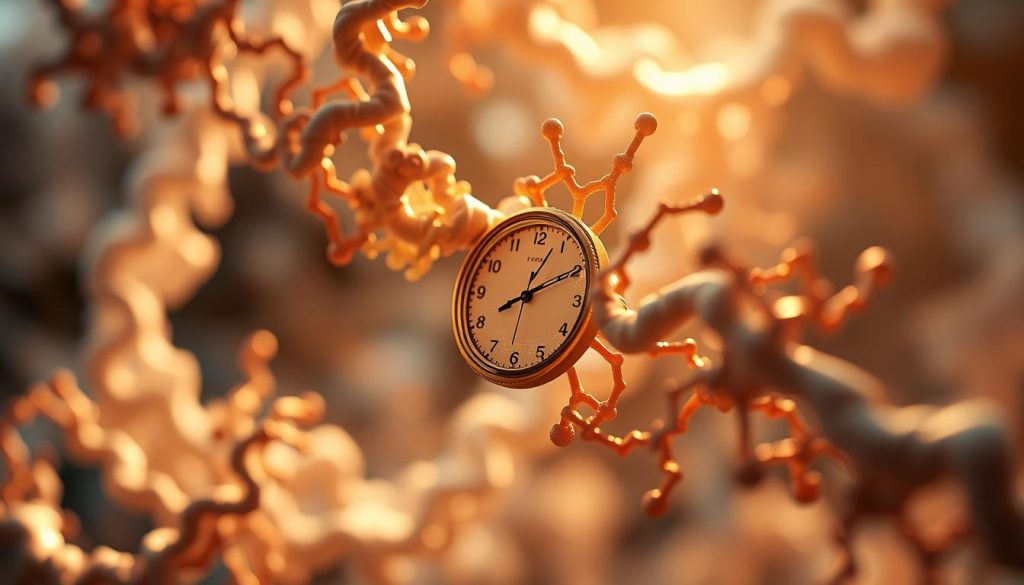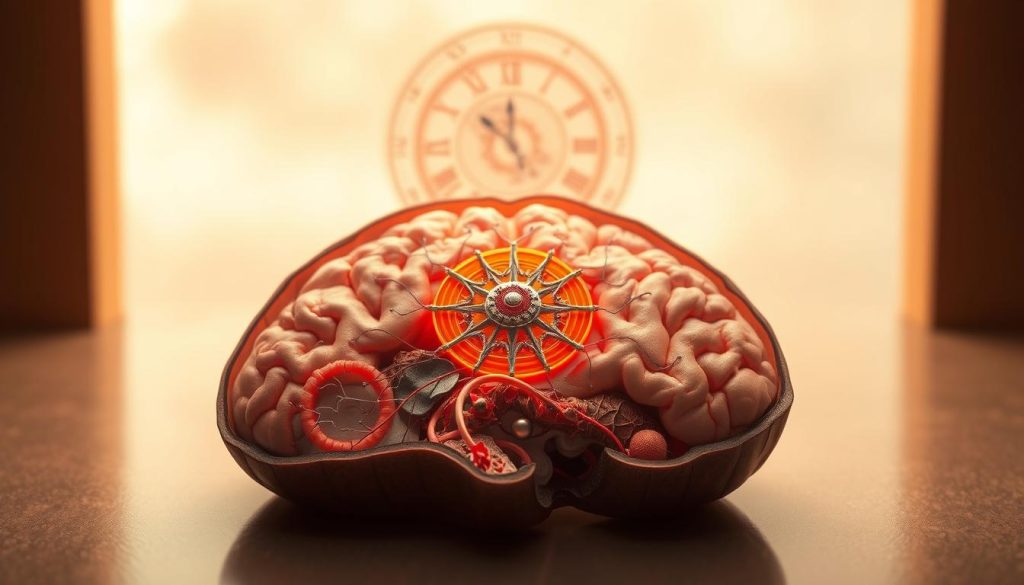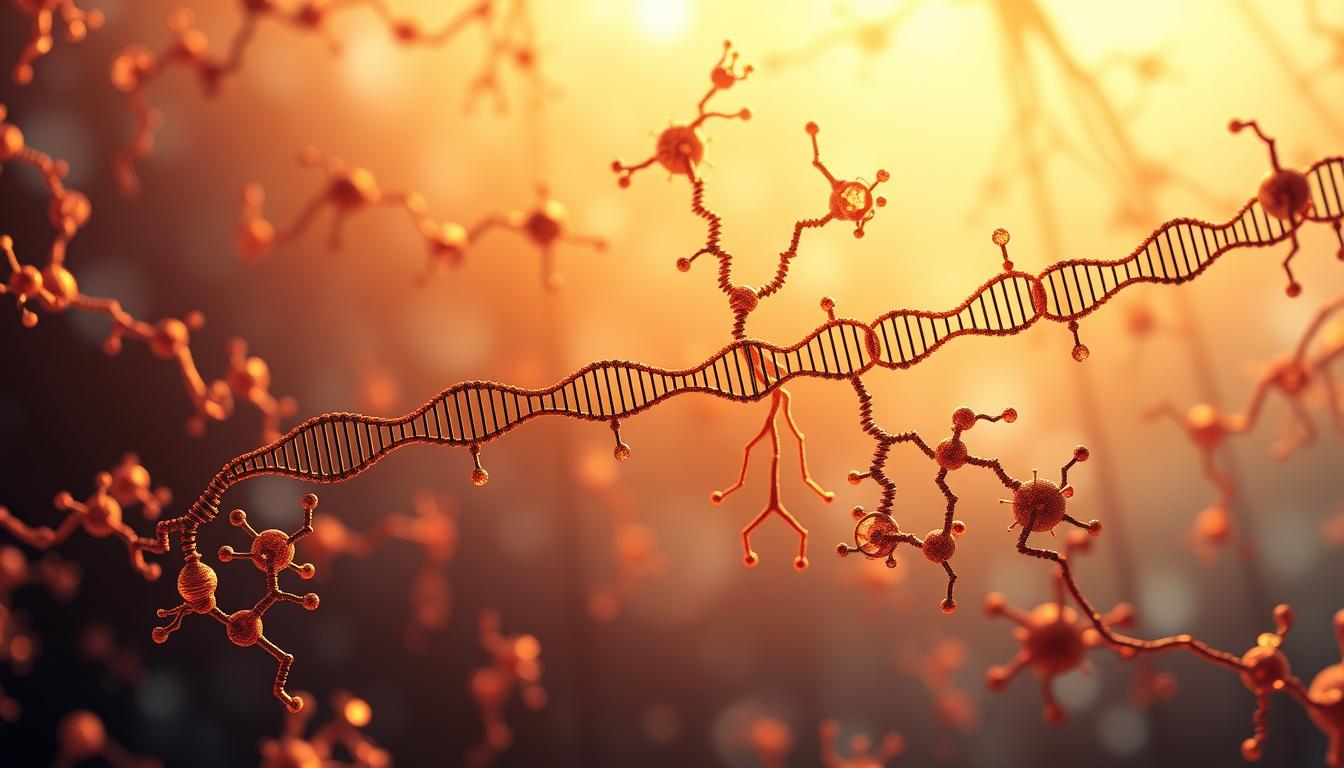Your body has an amazing internal schedule that never stops. Inside your cells, special genes work all day and night. They tell your body when to sleep, wake up, and even digest food.
For millions of years, these biological clocks have helped us adapt to day and night. They’re like your body’s personal assistant, managing hundreds of processes without you knowing. From your heart rate to hormone levels, they control it all.
But modern life often goes against these natural rhythms. Late-night screens, shift work, and irregular sleep can mess with your timing. When this happens, your health can suffer in unexpected ways. Learning about these genes is the first step to living in sync with your body’s rhythm.
Understanding Circadian Rhythms
Deep inside your cells, a complex timing system controls when you feel awake, tired, hungry, and full of energy. This internal clock runs all day to keep your body working well. Knowing how circadian rhythms work can help you plan your day better.
Your body doesn’t choose when to feel tired or hungry randomly. Instead, it follows a schedule that has evolved over millions of years. This natural timing system affects your digestion and immune function.
What Are Circadian Rhythms?
Circadian rhythms are biological processes that happen about every 24 hours in living things. The word “circadian” comes from Latin, meaning “about a day.” These rhythms control many important body functions.
Your internal clock manages several key processes all day:
- Body temperature changes
- Hormone production and release
- Blood pressure changes
- Digestive enzyme activity
- Immune system responses
These rhythms don’t happen by chance. They’re controlled by a master clock in your brain called the suprachiasmatic nucleus. This tiny area responds to light and darkness signals from your environment.

Your circadian rhythms stay consistent even without external time cues. Scientists have found that people living in caves without sunlight still maintain roughly 24-hour cycles. This shows how deeply embedded these patterns are in human biology.
How Do They Affect Your Daily Life?
Your sleep-wake cycles are just one part of how circadian rhythms affect your daily life. These internal timers influence your performance, mood, and health in ways you might not realize.
Think about how your energy levels change throughout the day. Most people feel most alert in the late morning and experience a dip in the afternoon. This pattern reflects your natural circadian rhythm at work.
Different groups face unique challenges with their circadian rhythms:
- Shift workers often struggle with disrupted sleep-wake cycles
- Frequent travelers deal with jet lag from crossing time zones
- Weekend warriors who stay up late may face “social jet lag”
- Students pulling all-nighters disrupt their natural timing
Understanding your personal circadian rhythms can help you optimize your daily schedule. You might find that you digest food better at certain times or perform mental tasks more effectively during specific hours.
Your body temperature also follows circadian patterns, typically dropping in the evening to prepare for sleep. This natural cooling helps trigger drowsiness and supports quality rest throughout the night.
The Role of Circadian Clock Genes
Your body’s natural rhythm is hidden in your DNA. Specialized genes act like a Swiss watch, keeping your internal timing system in check. They make sure every biological process happens at the right time.
Your body is like a busy city that never sleeps. It needs traffic lights and schedules to work smoothly. Circadian clock genes are like these, coordinating millions of cellular activities.

What Are Circadian Clock Genes?
Circadian clock genes produce proteins in 24-hour cycles. They create the biochemical foundation for your body’s natural rhythms. These genes are like tiny biological clocks in every cell of your body.
The main players in this genetic orchestra include several key genes. They work together seamlessly. Here are the main circadian clock genes that keep your body running on schedule:
- CLOCK genes that initiate the daily genetic cycle
- BMAL1 that partners with CLOCK to start transcription
- PERIOD genes that help create the feedback loop
- CRYPTOCHROME genes that provide negative feedback
- REV-ERB genes that fine-tune the timing
These genes don’t work alone. They form complex partnerships that create a self-sustaining cycle. When CLOCK genes team up with BMAL1, they kick-start the production of other clock proteins. This process repeats every 24 hours with remarkable precision.
How Do They Influence Biological Processes?
Your circadian clock genes influence virtually every aspect of your body’s function. They control when your liver processes nutrients most efficiently. They determine when your immune system is most active. They even regulate when your body temperature naturally rises and falls.
BMAL1 acts as a master regulator in this intricate system. It works closely with CLOCK genes to initiate what scientists call the “molecular clockwork.” Together, they turn on genes that control everything from hormone production to cell division.
The influence of these genes extends far beyond what you might expect. Here’s how they coordinate your body’s major systems:
- Metabolism: They control when your body burns fat versus storing it
- Hormone production: They regulate cortisol, melatonin, and growth hormone release
- Immune function: They determine when your white blood cells are most active
- Brain activity: They influence alertness, memory formation, and mood
This genetic symphony plays out in every organ system. Your heart beats differently at various times of day because of these genes. Your kidneys filter blood more efficiently during certain hours. Even your skin cells repair themselves according to circadian genetic signals.
The Science Behind Circadian Clock Regulation
Exploring how our internal clocks work is key to understanding chronobiology. This field has greatly expanded our knowledge of human biology. It shows that timing is crucial for our health and well-being.
The regulation of circadian rhythms is complex. It involves molecular machinery that works with great accuracy. Every cell in your body has its own molecular clock, working together in a perfect timing symphony.
Chronobiology and Its Importance
Chronobiology studies biological time and how it adapts to solar and lunar rhythms. It emerged in the 1960s and has changed medical research. It shows our bodies don’t just respond to time; they create and maintain it.
Chronobiology is more than just research. It has real-world applications in medicine, psychology, and health management. It helps doctors time medications and explains why treatments work better at certain hours.

The suprachiasmatic nucleus is the master timekeeper. It’s in the hypothalamus and has about 20,000 specialized neurons. These cells get input from light-sensitive cells in your eyes, syncing with the environment.
This master clock works with peripheral clocks in your body. Organs like the liver, heart, and kidneys have their own timing. The suprachiasmatic nucleus makes sure they all work together.
Feedback Loops in Circadian Rhythm
Circadian rhythms rely on feedback loops for precision. These loops self-regulate timing like a biological thermostat. Genes turn on and off in sequences that keep rhythm.
At the cellular level, clock genes produce proteins that accumulate. When these proteins reach certain levels, they start to slow down their own production. This creates the oscillating pattern of circadian rhythms, repeating every 24 hours.
Multiple feedback loops ensure accuracy and stability. Primary loops involve core clock genes, while secondary loops fine-tune the system. This redundancy keeps your timing system stable even with small disruptions.
The beauty of these feedback mechanisms is their self-correcting nature. When external factors try to disrupt your rhythm, these loops work to restore balance. This helps explain why your body can adapt to minor schedule changes while keeping overall timing intact.
Circadian Clock Genes and Sleep
Every night, your body’s clock genes work hard to help you sleep. They control when you feel tired and when you’re ready to wake up. This happens every 24 hours.
These genes don’t just decide when you sleep. They also affect how well you sleep and when. This helps your body rest and recover over time.
How Genes Affect Sleep Patterns
Your DNA decides if you’re a morning person or a night owl. Different genes make people sleep at different times. Some people wake up early, while others stay up late.
These genes also control melatonin, your sleep hormone. When it gets dark, your genes make melatonin. This tells your brain it’s time to sleep.
Genes also manage when you have different sleep phases. REM sleep, deep sleep, and light sleep happen at certain times. Your genes make sure you get the right sleep at the right time.
Waking up in the morning is also controlled by your genes. As morning comes, your genes stop making melatonin. They start making cortisol and raising your body temperature to wake you up.
The Link Between Sleep Quality and Health
Good sleep timing is key to staying healthy. It boosts your immune system. This helps your body fight off sicknesses better.
Bad sleep can cause serious health issues. It can lead to diabetes, heart disease, and obesity. It can also make you feel depressed and anxious.
Healthy sleep habits help your genes work better. When you sleep at the same times every day, your genes function well. This leads to better sleep and more health benefits.
Your sleep also affects hormone levels. Growth hormone, insulin, and stress hormones follow a daily pattern. When they work together, you feel your best all day.
Impacts of Disrupted Circadian Rhythms
Disrupted circadian rhythms can make you tired and affect your health. Your body struggles to balance hormones and processes when your internal clock is off. Modern life often messes with the cues that help keep your clock in sync.
Shift workers, travelers, and those with irregular sleep face health issues. Your body needs predictable patterns. When these patterns get mixed up, your health suffers.
Effects on Mental Health
Your mental health relies on the timing of brain chemicals and hormones. Disrupted rhythms mess up this timing. Serotonin, which helps regulate mood, peaks during the day and drops at night.
Irregular sleep patterns disrupt this rhythm. This is why night shift workers and those with jet lag often feel depressed and anxious. Your brain expects serotonin to rise with morning light, but irregular schedules confuse this.

Cortisol, your stress hormone, also has a daily schedule. It should rise in the morning and fall at night. But, when light and meal times send mixed signals, cortisol gets out of sync.
The mental health effects of disrupted rhythms include:
- Increased risk of depression and seasonal affective disorder
- Higher anxiety levels and panic attacks
- Difficulty concentrating and memory problems
- Mood swings and emotional instability
- Reduced cognitive performance and decision-making ability
People with irregular sleep are 23% more likely to develop depression. The link between rhythms and mental health is so strong that light therapy is used to treat seasonal depression.
Consequences for Physical Health
Disrupted rhythms can harm your physical health. Your metabolism, immune system, and heart health rely on precise timing. When rhythms are off, your body can’t maintain itself properly.
Metabolic disruption is a serious issue. Your body is programmed to process food at certain times and fast at others. Eating late or skipping breakfast goes against millions of years of evolution.
Disrupted rhythms affect your physical health in several ways:
- Increased risk of obesity and type 2 diabetes
- Weakened immune system and frequent infections
- Higher blood pressure and heart disease risk
- Digestive problems and gut health issues
- Accelerated aging and cellular damage
Your immune system also has a daily schedule. Certain cells are more active during the day, while others work harder at night. Shift workers and those with chronic sleep issues get sick more often because their immune systems can’t keep time.
Cardiovascular health also depends on timing. Blood pressure dips at night, giving your heart a break. But, when this pattern is disrupted, your risk of heart attack and stroke goes up. Studies show night shift workers have a 40% higher risk of heart disease.
Modern life disrupts your body’s natural rhythms. Artificial lighting and irregular meal times confuse your internal clock. Your body needs consistent cues to stay healthy, but our 24/7 society often provides conflicting signals.
Lifestyle Choices That Influence Circadian Rhythms
The foods you eat and the light you see each day affect your body’s internal timing. Your biological clocks respond to these cues in ways that can either support or disrupt your natural rhythms. Making smart choices about when and what you eat, along with managing your light exposure, gives you powerful tools to work with your circadian clock genes rather than against them.
Small changes in your daily routine can create big improvements in how you feel and function. Your body is designed to thrive when it receives consistent signals about the time of day. By understanding how lifestyle factors affect your internal timing, you can make adjustments that feel natural and sustainable.
Nutrition and Its Timing
When you eat matters just as much as what you eat for your circadian health. Your digestive system has its own biological clocks that work best when meals happen at regular times. Eating at consistent hours helps synchronize these peripheral clocks throughout your body.
The concept of chrono-nutrition shows how the same meal can affect your body differently depending on timing. Your metabolism naturally shifts throughout the day, making morning and afternoon the best times for larger meals. Late-night eating disrupts the natural fasting period that helps reset your circadian clock genes.
Here are key nutrition timing strategies that support healthy rhythms:
- Eat your largest meal earlier in the day when metabolism is most active
- Stop eating at least 3 hours before bedtime to allow proper fasting
- Maintain consistent meal times, even on weekends
- Choose lighter foods for evening meals to avoid digestive disruption
- Stay hydrated throughout the day but reduce fluids before sleep
The Effects of Light Exposure
Light serves as the most powerful signal for your circadian clock genes. Your eyes connect directly to the brain region that controls your biological clocks. This connection makes light management one of your most effective tools for circadian health.
Morning sunlight exposure helps set your internal clock for the day ahead. Even 15-20 minutes of natural light can strengthen your circadian rhythms. This early light exposure tells your body it’s time to be alert and active.
Evening light exposure, especially blue light from screens, can confuse your internal timing system. This artificial light tricks your brain into thinking it’s still daytime, which delays the release of sleep hormones.
Practical light management strategies include:
- Get outside for natural light within an hour of waking up
- Use bright lights in your workspace during the day
- Dim lights in your home 2-3 hours before bedtime
- Consider blue light blocking glasses for evening screen use
- Keep your bedroom as dark as possible during sleep hours
These simple adjustments work with your body’s natural design. Your circadian clock genes respond to these consistent signals by maintaining stronger, more stable rhythms that support better sleep, energy, and overall health.
Future Research and Implications of Circadian Clock Genes
The field of chronobiology is at an exciting point. Scientists are finding new ways to use our circadian rhythms for better health. Research on CLOCK genes is leading to groundbreaking medical treatments.
Potential Applications in Medicine
Doctors are creating treatments that match your body’s natural rhythms. Cancer treatments are showing promise when given at the right time. Heart disease prevention is also being looked at through the lens of circadian timing.
Drug companies are making medicines that work with your internal clock. This method reduces side effects and makes treatments more effective. Diabetes management is improving when insulin is given at the right time.
Understanding Genetic Variations and Their Impact
Your CLOCK genes affect how you react to medicines and treatments. Soon, genetic testing might help doctors tailor your care schedule. Some people naturally process drugs faster at certain times because of their genetics.
Future workplace policies might consider your chronobiology. Exercise programs could be made to fit your genetic preferences. Meal timing recommendations might become as unique as your fingerprint.
The science of circadian clock genes is growing fast. Each new discovery brings us closer to personalized medicine. Your body’s natural rhythm holds the secrets to optimal health, and researchers are just starting to explore them.

